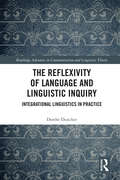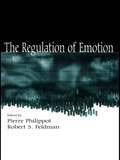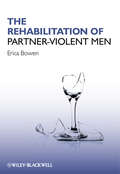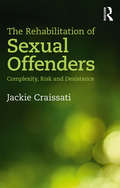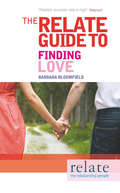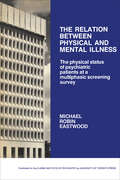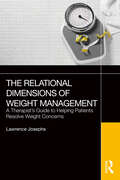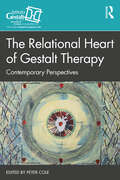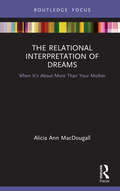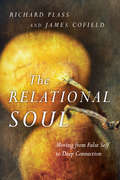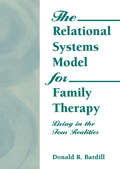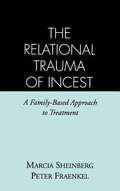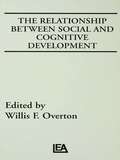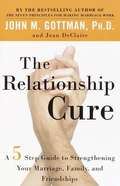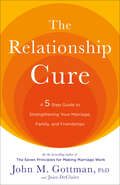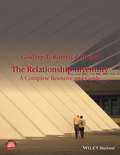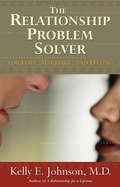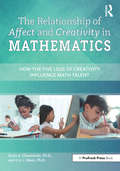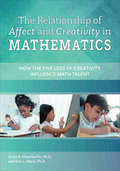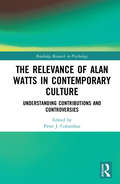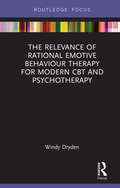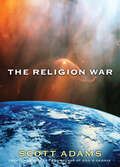- Table View
- List View
The Reflexive Imperative in Late Modernity
by Margaret S. ArcherThis book completes Margaret Archer's trilogy investigating the role of reflexivity in mediating between structure and agency. What do young people want from life? Using analysis of family experiences and life histories, her argument respects the properties and powers of both structures and agents and presents the 'internal conversation' as the site of their interplay. In unpacking what 'social conditioning' means, Archer demonstrates the usefulness of 'relational realism'. She advances a new theory of relational socialisation, appropriate to the 'mixed messages' conveyed in families that are rarely normatively consensual and thus cannot provide clear guidelines for action. Life-histories are analysed to explain the making and breaking of the various modes of reflexivity. Different modalities have been dominant from early societies to the present and the author argues that modernity is slowly ceding place to a 'morphogenetic society' as meta-reflexivity now begins to predominate, at least amongst educated young people.
The Reflexivity of Language and Linguistic Inquiry: Integrational Linguistics in Practice (Routledge Advances in Communication and Linguistic Theory)
by Dorthe DunckerThis book explores the reflexivity of language both from the perspective of the lay speaker and the linguistic analyst. Linguistic inquiry is conditional upon linguistic reflexivity, but so is language. Without linguistic reflexivity, we would not be able to make sense of everyday linguistic communication, and the idea of a language would not be conceivable. Not even fundamental notions such as words or meaning would exist. Linguistic reflexivity is a feature of the communication process, and it essentially depends on situated participants and time. It is a defining characteristic of the human language but despite its obvious importance, it is not very well understood theoretically, and it is strangely under-researched empirically. Throughout history and in modern linguistics, it has mostly either been taken for granted, misconstrued, or ignored. Only integrational linguistics fully recognizes its specifically linguistic implications. However, integrational linguistics does not provide the necessary methodological basis for investigating linguistic phenomena empirically. This catch-22 situation means that the goal of the book is twofold: one part is to explore the reflexivity of language theoretically, and the other part is to propose an applied integrational linguistics and to implement this proposal in practice.
The Regulation of Emotion
by Robert S. Feldman Pierre PhilippotThe main goal of this volume is to present, in an integrated framework, the newest, most contemporary perspectives on emotion regulation. The book includes empirically-grounded work and theories that are central to our understanding of the processes that constitute emotion regulation and their consequences. This volume has several secondary aims, as well. One is to highlight several newer subareas in the domain of emotion regulation that hold much promise, such as the relationship between psychopathology and emotion regulation. The book also presents data and theory that have applied value that may be useful for people working in such fields as communication, psychotherapy, and counseling. Finally, the volume gathers contributions across a variety of subfields and includes authors working not just in North America but in other areas of the world. To help achieve these goals, the volume has been organized to begin with the presentation of the most molecular aspects of emotion regulation and to end with the most molar ones. It comprises four parts, each integrating different lines of research from related domains. Part I is devoted to basic processes in emotion regulation, such as neurological, physiological or cognitive processes; part II examines the interplays between emotion regulation and individual regulation; part III presents work on individual differences and developmental processes in emotion regulation; and part IV examines the social functions and constraints of emotion regulation.
The Rehabilitation of Partner-Violent Men
by Erica BowenDrawing on an extensive body of literature, The Rehabilitation of Partner-Violent Men presents an historical account of the policy changes that have led to rehabilitation programmes for male perpetrators of intimate partner violence within the criminal justice system.Presents a review of the current state of male partner-violence theory and related intervention programmes in the UKDraws on both national and international literature within the fieldProvides an overview of the theoretical foundation behind current approaches to the rehabilitation of partner-violent menOffers an appraisal of the effectiveness of current practices??and directions for future advances in intervention and evaluation science
The Rehabilitation of Sexual Offenders: Complexity, Risk and Desistance
by Jackie CraissatiSexual offenders – arguably the most hated and feared of all offenders – commit their crimes in our communities and are then hidden from public view as they serve long prison sentences. However, despite the public’s understandable anxiety, our criminal justice systems hold to the premise that almost all offenders have the right to hope for rehabilitation, even redemption. Therefore the majority of sexual offenders return to live in our communities, closely monitored by criminal justice agencies and subject to rigorous controls. This book provides an authoritative guide to working with sexual offenders, with a focus on managing those who are reintegrating into the community. It includes those with the most striking histories of trauma and psychological difficulty, and those who have previously failed in their attempts at resettlement. It covers helpful theoretical ideas, such as attachment theory and models of desistance, as well as the latest evidence base for good quality risk assessment. The book supports practitioners on the front line of this work by providing them with evidence-based guidance. It presents a multitude of case examples and practice tips that can support effective decision making and achieve safe outcomes, as well as help such offenders build worthwhile community lives.
The Reign of Speech: On Applied Lacanian Psychoanalysis (The Palgrave Lacan Series)
by Dries G. DulssterThis book provides an in-depth examination of Lacanian oriented psychotherapy and supervision, drawing on a wide range of Lacanian texts and rich interview data.Beginning with a comprehensive overview of the Lacanian psychoanalytic therapeutic process, it next considers this in relation to Lacanian texts – including, ‘The Function and Field of Speech and Language in Psychoanalysis’, ‘Direction of the Treatment’, ‘Lacanian Discourses’ and ‘Seminar XXIII’ – and interview data from ex-analysants and psychoanalysts.The second part of the book offers the first systematic discussion of Lacanian supervision. Through a sophisticated theoretical analysis and unique research material, Dries Dulsster has created an important reference point for students, scholars and clinicians that will appeal to those new to Lacanian practice, and those already deeply involved in it.
The Relate Guide to Finding Love
by Barbara Bloomfield RelateWhy are you looking for love right now? What kind of relationship do you want? How will you know if you find 'The One'? The Relate Guide to Finding Love will answer all these questions, and more.From the UK's leading relationship counsellor, The Relate Guide to Finding Love offers common sense help and advice on all aspects of dating and relationships. Short, snappy chapters, each containing a thought-provoking exercise, plus personal case histories, combine to make this a fun and interesting read to help you to:- Discover your needs and what you expect from a relationship- Get yourself into the right frame of mind to meet someone new- Make the most of online dating and singles events- Identify whether your new love is really the one for youWhether you are looking for a long-term relationship or just a quick fling, this practical, accessible guide is perfect for you.
The Relation between Physical and Mental Illness: The Physical Status of Psychiatric Patients at a Multiphasic Screening Survey
by Michael EastwoodThe relation between mind and body has been keen of interest since antiquity. The author surveys the approaches to the subject from the observational to the experimental level. He presents the findings of a study carried out, at a community health screening survey, to test the association between physical and psychiatric disorder. The methodological difficulties of this kind of study, such as sampling the general population and reliable measurement of clinical states, are described. The results of the study, which confirm the two types of morbidity have a positive and significant association, are discussed in terms of the ecology of disease and psychosomatic medicine. It is suggested that the findings have implications for the delivery of health care and preventive medicine.
The Relational Dimensions of Weight Management: A Therapist’s Guide to Helping Patients Resolve Weight Concerns
by Lawrence JosephsThe Relational Dimensions of Weight Management is a book for nonspecialist psychotherapists of any theoretical orientation to help patients concerned with weight management. Psychotherapy patients use their therapists as sounding boards to help them answer two questions: Do I need to lose weight? And, if I do need to lose weight, how should I go about it? Chapters provide therapists with the tools they need to help patients find personalized solutions to their weight loss concerns, to boost their self-image, and to deal with the judgment that is sometimes imposed by others, regardless of which weight management approach patients eventually embrace.
The Relational Heart of Gestalt Therapy: Contemporary Perspectives (Gestalt Therapy Book Series)
by Peter ColeThis compelling and comprehensive volume is an anthology of current thinking by many of gestalt therapy’s leading theoreticians, clinicians, and researchers. Including many well-known voices in the field and introducing several new ones to the current gestalt therapy literature, the book presents a broad-ranging compendium of essays, scientific articles, clinical applications, and integrative approaches that represent the richness and vibrancy of the field. Each contributor brings intellectual rigor, honest personal reflection, and humanism to their area of inquiry. This ethos—the spirit of relational gestalt therapy—infuses the whole book, bringing a sense of coherence to its seventeen chapters. Following an introduction written by Mark Winitsky, PhD, as an entry point into the field for students and psychotherapists from other schools of thought, the book is organized into three sections: Theory, Clinical Applications, and Integrative Approaches. Readers will encounter new ways of thinking about psychotherapy, new skills they can bring to their work, and new ways of integrating gestalt therapy with other approaches. The Relational Heart of Gestalt Therapy is essential reading for Gestalt therapists as well as other mental health professionals with an interest in Gestalt approaches.
The Relational Interpretation of Dreams: When it’s About More Than Your Mother
by Alicia Ann MacDougallThis book explains the use of dreams as a tool in psychotherapy to provide meaning, establish and maintain a therapeutic relationship, and thus enhance and progress treatment. Maintaining a focus on the synergy between dreams and relationship, it includes interviews with four eminent dream researchers and scholars: John S. Antrobus, G. William Domhoff, Mark J. Blechner, and J. Allan Hobson. This book explores the synergistic qualities between dreams and relationships, and how that synergy generates biographically, professionally, and psychotherapeutically formative experiences. The book delineates the ways in which dreams provide a foundation for relating, provides a container (Bion, 1967/1993) for the unthought known (Bollas, 1987), creates meaning through relationships, and ultimately fosters dispersion of relational dynamics originating from the culture of the times and more. From a relational psychoanalytic perspective, this book describes the role of dreams in shaping our relational living. This book provides a unique perspective that illustrates using yourself as a tool in relational establishment, preservation, and knowing. It is ideal for students working toward an understanding of the influence of intersubjective space in clinical interactions and clinicians looking for additional and alternate ways to connect with patients.
The Relational Soul: Moving from False Self to Deep Connection
by Richard Plass James CofieldWhat does loneliness tell us? "Be it chronic or acute, slight or significant, loneliness is proof of our relational design. At the core of our being is this truth—we are designed for and defined by our relationships," former pastors Plass and Cofield write. "We were born with a relentless longing to participate in the lives of others. Fundamentally, we are relational souls." Our ability to make deep and emotionally satisfying connections rests on the capacity to trust, and we all know trust can be difficult. Early-life relational "programming" and patterns of attachment can serve as blueprints for relationships later in life, whether good or bad. But no matter our conditioning, God is out to reclaim and restructure the deepest terrain of the human soul by helping us shed our reactive "False Self" and put on our receptive "True Self." Through spiritual disciplines and a conscious participation in the love of the Father, Son and Spirit, we transform our self-awareness and our connection with other people. Authored by counselor Dr. Richard Plass and spiritual director James Cofield, The Relational Soul brings together concepts from psychology and spiritual formation. Each chapter includes introductory stories and practical "If this is true, what about you?" questions to help readers engage in relationships in more life-giving ways. When the presence of Christ and community connects with a soul that is open, we witness the miracle of transformation.
The Relational Subject
by Margaret S. Archer Donati, Pierpaolo and Archer, Margaret S. Pierpaolo DonatiMany social theorists now call themselves 'relational sociologists', but mean entirely different things by it. The majority endorse a 'flat ontology', dealing exclusively with dyadic relations. Consequently, they cannot explain the context in which relationships occur or their consequences, except as resultants of endless 'transactions'. This book adopts a different approach which regards 'the relation' itself as an emergent property, with internal causal effects upon its participants and external ones on others. The authors argue that most 'relationists' seem unaware that analytical philosophers, such as Searle, Gilbert and Tuomela, have spent years trying to conceptualize the 'We' as dependent upon shared intentionality. Donati and Archer change the focus away from 'We thinking' and argue that 'We-ness' derives from subjects' reflexive orientations towards the emergent relational 'goods' and 'evils' they themselves generate. Their approach could be called 'relational realism', though they suggest that realists, too, have failed to explore the 'relational subject'.
The Relational Systems Model for Family Therapy: Living in the Four Realities
by Carlton Munson D Ray BardillThe Relational Systems Model for Family Therapy presents a multi-systems approach to family therapy that teaches the therapist important self-differentiating capacities that set the tone for creating a powerful therapeutic atmosphere. While the model demands no specific treatment procedures, it does rely on the therapist&’s capacity to adhere to its basic ideas, as she/he is the most vital factor in the model&’s success.In The Relational Systems Model for Family Therapy, Author Donald R. Bardill encourages the therapist to be the learning vehicle for the integration of the four realities of life (self, other, context, spiritual) and the differentiating process that is necessary for human survival, safety, and growth. Understanding this model allows therapists to lead clients to heightened self-awareness and the realization of their human potential--both important factors for intellectual growth, emotional maturity, and problem solving. To this end, readers learn about: the self-differentiating therapist--the person-of-the-therapist is the crucial variable in an effective family treatment process the facing process--the client faces such issues as self-identity, life-purpose, thought and behavior patterns, emotionalized fears, and the future emotionalized right/wrong--focus is on consequences of actions rather than right/wrong judgments in relationship issues life stances--the uniqueness of the individual affects their connection to the life realities family grid--a way for the therapist to organize and talk about important family systems dynamics the therapeutic paradox--the client&’s worldview is examined through the therapist&’s worldview and a new worldview is formedThe Relational Systems Model for Family Therapy is an important handbook for practitioners and students in the fields of clinical social work, psychology, marriage and family therapy, mental health counseling, counseling psychology, pastoral counseling, and psychiatric nursing. The book is also useful as a supplemental text for advanced undergraduate classes and postgraduate seminars in family therapy and family counseling. The self-differentiation nature of the content also lends this book useful to self-help readers.
The Relational Trauma of Incest: A Family-Based Approach to Treatment
by Marcia Sheinberg Peter FraenkelThis book presents an innovative approach to navigating the painful confusions and dilemmas experienced by families in which incest has occurred. The authors show that while not all incestuously abused children experience the classic diagnostic symptoms of trauma, virtually all do experience "relational trauma" disruptions in the sense of safety, security, loyalty, and trust that may block connection and open communication with nonoffending family members.
The Relationship Between Social and Cognitive Development (Jean Piaget Symposia Series)
by Willis F. OvertonPublished in the year 1983, The Relationship Between Social and Cognitive Development is a valuable contribution to the field of Developmental Psychology.
The Relationship Cure: A 5 Step Guide to Strengthening Your Marriage, Family, and Friendships
by John Gottman Joan DeclaireA groundbreaking, practical program for transforming troubled relationships into positive ones "This is the best book on relationships I have ever read. . . . John Gottman has decoded the subtle secrets that can either enrich or destroy the quality of our ties with others. " Daniel B. Wile, Ph. D. , author ofAfter the Fight: Using Your Disagreements to Build a Stronger Relationship "John Gottman is our leading explorer of the inner world of relationships. InThe Relationship Cure, he has found gold once again. "William J. Doherty, Ph. D. , author ofTake Back Your Marriage: Sticking Together in a World That Pulls Us Apart "When he says his five steps will help you build better connections with the people you care about, you know that they have been demonstrated to work. " E. Mavis Heatherington, Ph. D. , professor of psychology, University of Virginia From the country's foremost relationship expert andNew York Timesbestselling author Dr. John M. Gottman comes a powerful, simple five-step program, based on twenty years of innovative research, for greatly improving all of the relationships in your life--with spouses and lovers, children, siblings, and even your colleagues at work. In The Relationship Cure, Dr. Gottman: * Reveals the key elements of healthy relationships, emphasizing the importance of what he calls "emotional connection" * Introduces the powerful new concept of the emotional "bid," the fundamental unit of emotional connection * Provides remarkably empowering tools for improving the way you bid for emotional connection and how you respond to others' bids
The Relationship Cure: A 5 Step Guide to Strengthening Your Marriage, Family, and Friendships
by John GottmanA groundbreaking, practical program for transforming troubled relationships into positive ones“This is the best book on relationships I have ever read. . . . John Gottman has decoded the subtle secrets that can either enrich or destroy the quality of our ties with others.” Daniel B. Wile, Ph.D., author of After the Fight: Using Your Disagreements to Build a Stronger Relationship“John Gottman is our leading explorer of the inner world of relationships. In The Relationship Cure, he has found gold once again.”William J. Doherty, Ph.D., author of Take Back Your Marriage: Sticking Together in a World That Pulls Us Apart“When he says his five steps will help you build better connections with the people you care about, you know that they have been demonstrated to work.” E. Mavis Heatherington, Ph.D., professor of psychology, University of VirginiaFrom the country’s foremost relationship expert and New York Times bestselling author Dr. John M. Gottman comes a powerful, simple five-step program, based on twenty years of innovative research, for greatly improving all of the relationships in your life—with spouses and lovers, children, siblings, and even your colleagues at work. In The Relationship Cure, Dr. Gottman:* Reveals the key elements of healthy relationships, emphasizing the importance of what he calls “emotional connection”* Introduces the powerful new concept of the emotional “bid,” the fundamental unit of emotional connection* Provides remarkably empowering tools for improving the way you bid for emotional connection and how you respond to others’ bids
The Relationship Inventory
by Godfrey T. Barrett-LennardWritten by a pioneer in person-centered therapy, this is the only resource to provide full access to the Barrett-Lennard Relationship Inventory (BLRI) - along with information on the instrument's history and development and supporting materials for counseling practitioners, researchers, and students. Provides a complete instrument for measuring empathy in relationships, a critical component for success across a wide range of therapeutic interventions Charts the development and refinement of the BLRI over more than 50 years, with particular attention to the influence of Carl Rogers' theories, and outlines the future potential of the instrument Contains all the materials necessary for critical understanding and application of the BRLI, including the full range of forms and adaptations, and guidelines for successful implementation Also presents the author's Contextual Selves Inventory (CSI), which permits direct study of the self as distinctively experienced in different relationship contexts
The Relationship Problem Solver: For Love, Marriage, And Dating
by Kelly E. JohnsonOne of the greatest skills you can develop in your love, marital, or dating relationship is the ability to quickly and effectively solve disagreements and problems. This new book by Dr. Kelly Johnson, the author of A Relationship for a Lifetime, will help you learn real and practical solutions that you can apply to difficult issues that could otherwise lead to relationship ruin.
The Relationship of Affect and Creativity in Mathematics: How the Five Legs of Creativity Influence Math Talent
by Scott A. Chamberlin Eric L. MannThe Relationship of Affect and Creativity in Mathematics explores the five legs of creativity—Iconoclasm, Impartiality, Investment, Intuition, and Inquisitiveness—as they relate to mathematical giftedness. This book:Discusses these affective components relevant to mathematical learning experiences.Shares how affective components impact students' creative processes and products.Shows the influence of learning facilitators, including teachers, afterschool mentors, and parents.Describes facilitating environments that may enhance the likelihood that creative process and ultimately product emerge.Utilizes the expertise of two young scholars to discuss the practical effects of affect and creativity in learning experiences.This practical, research-based book is a must-read for stakeholders in gifted education, as many advanced students are underidentified in the area of creativity in mathematics.
The Relationship of Affect and Creativity in Mathematics: How the Five Legs of Creativity Influence Math Talent
by Eric Mann Scott ChamberlinThe Relationship of Affect and Creativity in Mathematics explores the five legs of creativity—Iconoclasm, Impartiality, Investment, Intuition, and Inquisitiveness—as they relate to mathematical giftedness. This book:Discusses these affective components relevant to mathematical learning experiences.Shares how affective components impact students' creative processes and products.Shows the influence of learning facilitators, including teachers, afterschool mentors, and parents.Describes facilitating environments that may enhance the likelihood that creative process and ultimately product emerge.Utilizes the expertise of two young scholars to discuss the practical effects of affect and creativity in learning experiences.This practical, research-based book is a must-read for stakeholders in gifted education, as many advanced students are underidentified in the area of creativity in mathematics.
The Relevance of Alan Watts in Contemporary Culture: Understanding Contributions and Controversies (Routledge Research in Psychology)
by Peter J. ColumbusWhilst accounting for the present-day popularity and relevance of Alan Watts’ contributions to psychology, religion, arts, and humanities, this interdisciplinary collection grapples with the ongoing criticisms which surround Watts’ life and work. Offering rich examination of as yet underexplored aspects of Watts’ influence in 1960s counterculture, this volume offers unique application of Watts’ thinking to contemporary issues and critically engages with controversies surrounding the commodification of Watts’ ideas, his alleged misreading of Biblical texts, and his apparent distortion of Asian religions and spirituality. Featuring a broad range of international contributors and bringing Watts’ ideas squarely into the contemporary context, the text provides a comprehensive, yet nuanced exploration of Watts’ thinking on psychotherapy, Buddhism, language, music, and sexuality. This text will benefit researchers, doctoral students, and academics in the fields of psychotherapy, phenomenology, and the philosophy of psychology more broadly. Those interested in Jungian psychotherapy, spirituality, and the self and social identity will also enjoy this volume.
The Relevance of Rational Emotive Behaviour Therapy for Modern CBT and Psychotherapy (Routledge Focus on Mental Health)
by Windy DrydenThe Relevance of Rational Emotive Behaviour Therapy for Modern CBT and Psychotherapy explores the contemporary relevance of this treatment for modern psychotherapy, from the point of view of a leading contributor. First founded in 1955 by Albert Ellis, REBT still has much to offer the field. Despite this, the therapy has been increasingly neglected by cognitive behaviour therapy and other practitioners. To demonstrate its contributed relevance, Professor Windy Dryden outlines in this book his current thinking and practice in regard to REBT. He advocates its key features of flexibility and non-extremeness, and explores what he believes REBT has to contribute to the discussion surrounding contemporary issues in psychotherapy. The Relevance of Rational Emotive Behaviour Therapy for Modern CBT and Psychotherapy is an excellent resource for CBT and other therapists who would like to know more about the relevance of REBT to their work.
The Religion War
by Scott AdamsIn this frenetically paced sequel to Adams' best-selling "thought experiment," God's Debris, the smartest man in the world is on a mission to stop a cataclysmic war between Christian and Muslim forces and save civilization. The brilliantly crafted, thought-provoking fable raises questions about the nature of reality and just where our delusions are taking us.With publication of The Religion War, millions of long-time fans of Scott Adams' Dilbert cartoons and business bestsellers will have to admit that the literary world is a better place with Adams on the loose spreading new ideas and philosophical conundrums.Unlike God's Debris, which was principally a dialogue between its two main characters, The Religion War is set several decades in the future when the smartest man in the world steps between international leaders to prevent a catastrophic confrontation between Christianiy and Islam. The parallels between where we are today and where we could be in the near future are clear.According to Adams, The Religion War targets "bright readers with short attention spans-everyone from lazy students to busy book clubs." But while the book may be a three-hour read, it's packed with concepts that will be discussed long after, including a list of "Questions to Ponder in the Shower" that reinforce the story's purpose of highlighting the most important-yet most ignored-questions in the world.

